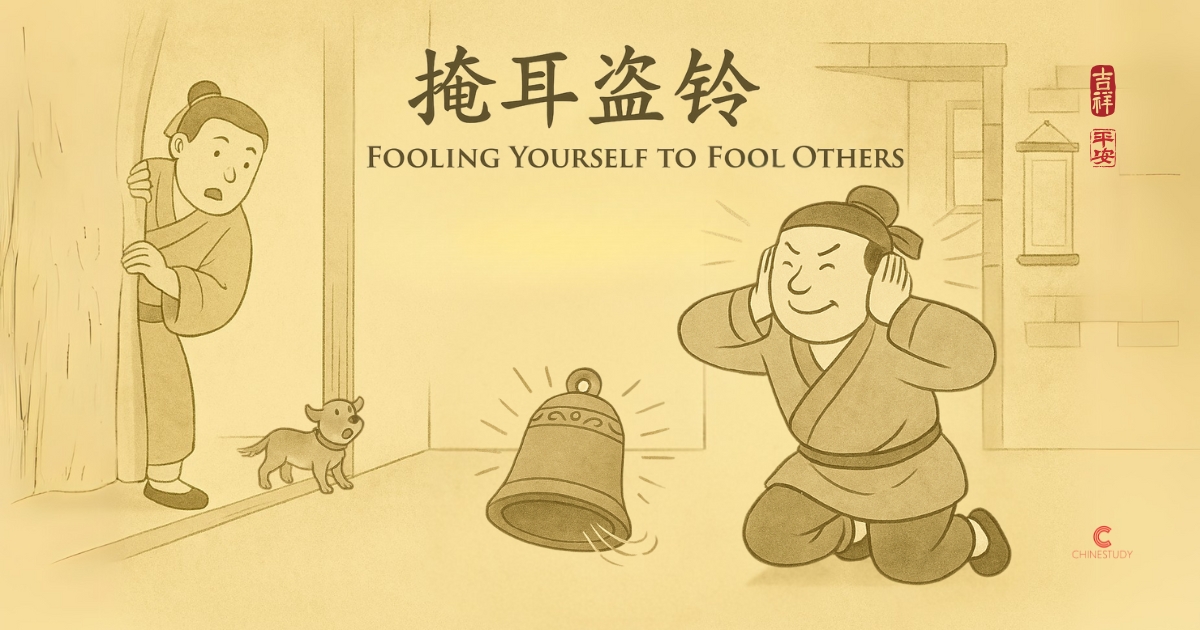🔔 掩耳盗铃 yǎn ěr dào líng – Fooling Yourself to Fool Others

🔍 What It Means
掩耳盗铃 (yǎn ěr dào líng) literally means “cover one’s ears while stealing a bell.”
Word-for-word:
- 掩 (yǎn) – to cover
- 耳 (ěr) – ears
- 盗 (dào) – to steal
- 铃 (líng) – bell
This idiom describes someone who tries to cover up an obvious fact by deceiving themselves — thinking others won’t notice.
In the end, it just makes them look foolish.
In English, it’s like saying:
- 🙈 “Burying your head in the sand”
- 🎭 “Self-deception”
- 🤡 “Fooling yourself to fool others”
🏺 Where It Comes From
This idiom comes from an old Chinese story.
A man wanted to steal a bell from another person’s house.
But as soon as he touched it — clang! — it made a loud noise.
Afraid of being discovered, he had an idea:
“If I can’t hear it, others won’t either.”
So he covered his own ears and took the bell.
But of course, everyone else heard the sound clearly.
That became a metaphor:
Trying to hide the truth from others often just shows self-deception.
💬 How to Use It
Use this idiom when someone ignores a clear problem and pretends it doesn’t exist — even though the truth is obvious.
- ❌ It’s a negative expression — often used to criticize self-deception
- ✅ Commonly used when someone is clearly avoiding reality, thinking it helps
🎯 Real Examples
1. 他以为删了聊天记录,别人就不会知道发生了什么,简直是掩耳盗铃。
- Tā yǐwéi shān le liáotiān jìlù, biérén jiù bú huì zhīdào fāshēng le shénme, jiǎnzhí shì yǎn ěr dào líng.
- 👉🏻 He thought that deleting the chat would keep others from knowing what happened — but that’s just fooling himself.
2. 有人明知道问题已经暴露,还装作一切正常,真是掩耳盗铃。
- Yǒurén míng zhīdào wèntí yǐjīng bàolù, hái zhuāngzuò yíqiè zhèngcháng, zhēn shì yǎn ěr dào líng.
- 👉🏻 Some people clearly know the problem is exposed, but still pretend everything is fine — that’s classic self-deception.
⚠️ Common Mistakes (Watch Out!)
❌ Mistake: Thinking it means “pretending not to care”
✅ Correct: It describes avoiding reality by lying to oneself
❌ Mistake: Using it in a neutral or polite tone
✅ Correct: It always carries a mocking or critical meaning
💡 Memory Tip

Picture someone trying to steal a large bell.
The moment it’s touched — CLANG! — the sound is loud and clear.
Panicking, the thief covers his ears.
He believes, “If I can’t hear it, then no one else can either.”
But the sound continues — for everyone else.
That’s 掩耳盗铃 — covering the ears doesn’t cover the truth.
It only shows how foolish the act really is.
🧩 Interactive Practice
Translate this sentence into English:
- 这种做法只是掩耳盗铃,没有用。
Answer:
That approach is just deceiving oneself — it doesn’t work.
🌟 Final Thoughts
掩耳盗铃 is a reminder that hiding from the truth doesn’t protect anyone — it only exposes the problem more clearly.
Avoiding the truth may feel easier for a moment.
But clarity and honesty are what lead to real solutions.
👉 Stay tuned for the next idiom in this series!
Thank you for subscribing!
Have a great day!